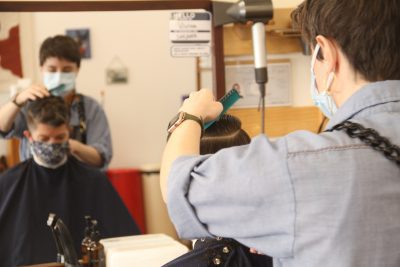Palberta: A Carnival of Controlled Chaos
On the back of the Bye Bye Berta album cover there’s a transcription of “Mary Had a Little Lamb” that Ani wrote as a child. The spelling might not be entirely accurate and the letters might not all be orthodox, but you can see her undeniable confidence there. It comes from a place of youth and wonder that is hard, if not impossible, for most people to find again. But that’s exactly where all of Palberta’s albums come from.
New York City natives Lily Konigsberg, Anina Ivry-Block (Ani), and Nina Ryser grew up in families that preached creativity, and came across music at an early age. But it wasn’t unil they all met as students at Bard that they began churning out releases as Palberta. Their previous full-length releases My Pal Berta (2013) and Shitheads in the Ditch (2014) immediately exposed their fierce experimentalism and joyous urgency. In Bye Bye Berta (2017), their musical language is refined further, in the 20-song effort, to short bursts of energy and absurdist lyrics. It was released by Wharf Cat Records and Ramp Local on February 10th. I talked with them about their album art, and being women in 2017.
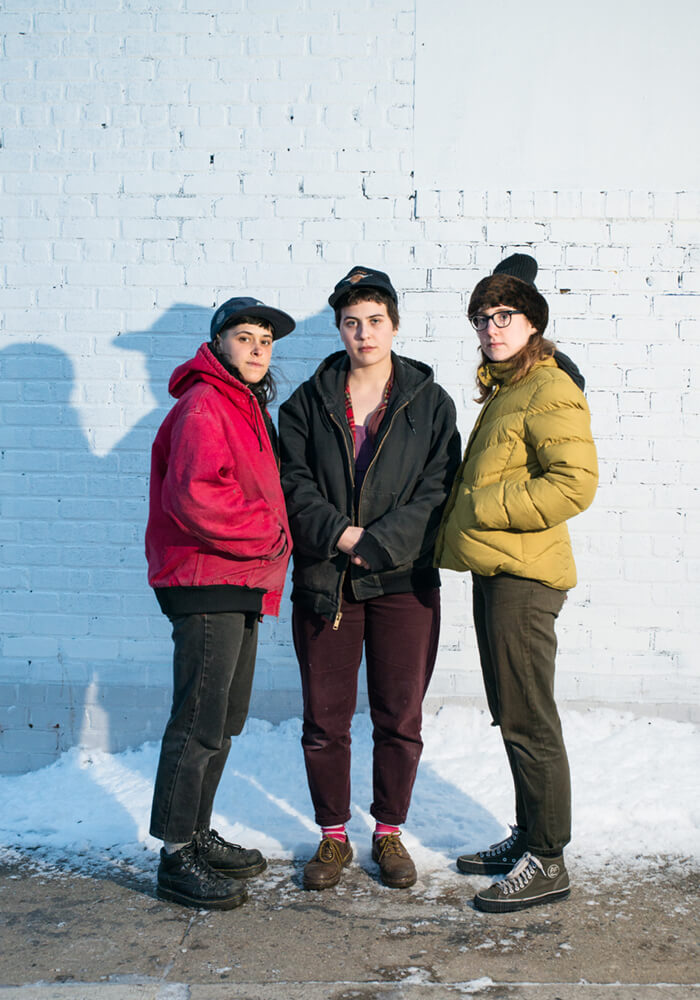

Brooklyn Magazine: After you played together for the first time, did you know you were going to be a band?
Nina: No, I don’t think so.
Ani: We kind of started saying “Let’s be a band!” and then we practiced.
Nina: It was like… we should jam sometime. I didn’t know Ani or Lily very well, but we jammed, and from then on it was just sort of decided, unspoken that it was going to be a band.
Lily: We didn’t love it though. Right? The first time we played.
Ani: No.
Lily: I was like… I’m not sure about this.
Nina: I really liked it.
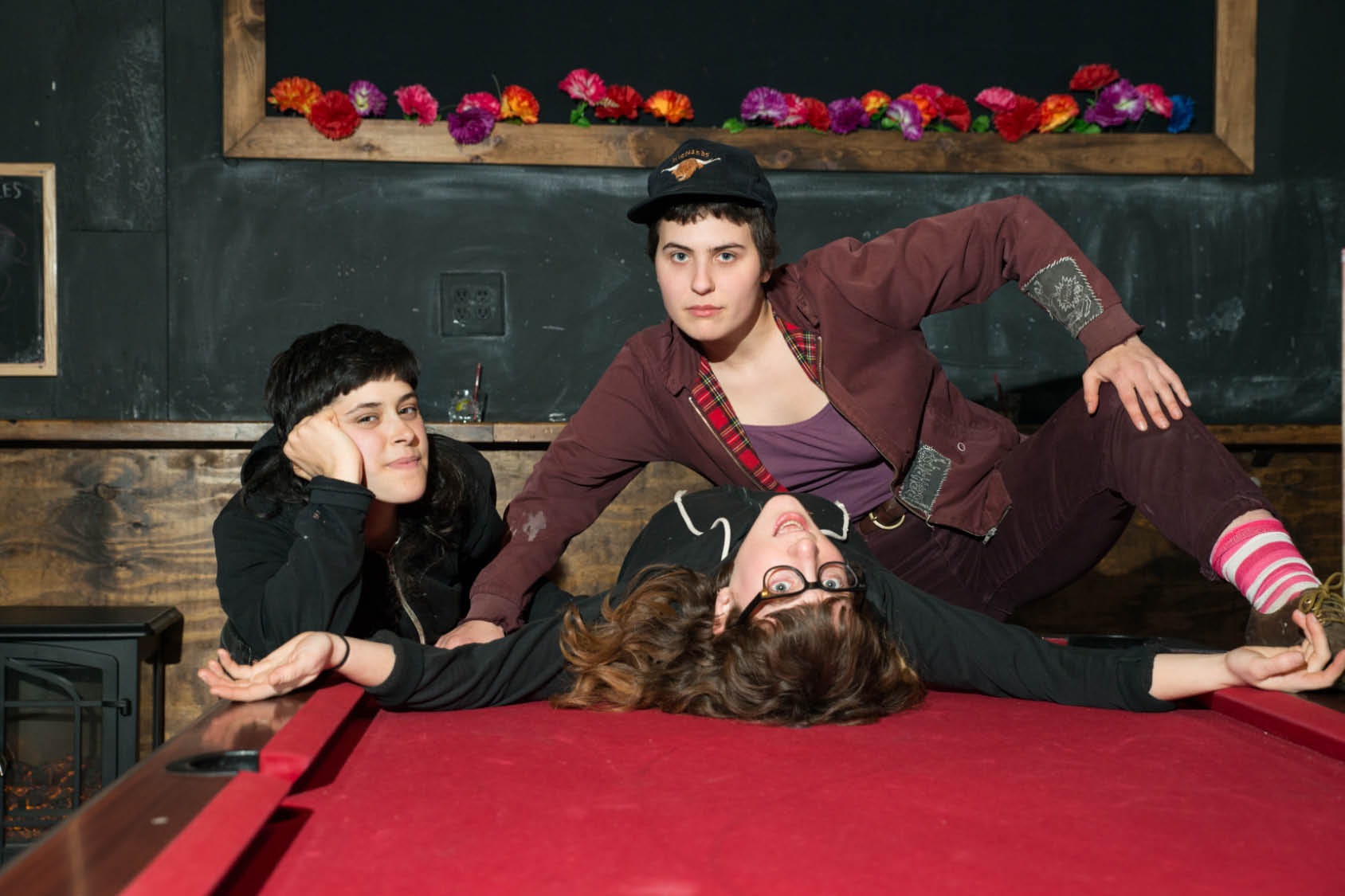

At that time did you have instruments you were each playing at that time?
Lily: We switched immediately. We knew we all wanted to switch, but I thought I would probably be playing guitar most, and you were playing a lot of bass, and drums.
Nina: I think there was a very new element for all of us when we started. I had never played bass ever until Palberta.
Lily: I never played drums. When I saw that people wanted to switch in the band, then it became mandatory. Now when I play with people and I’m playing the same thing (instrument) for the whole time I get bored. It’s just so much fun to be able to play everything.
Now when I play with people and I’m playing
the same thing (instrument) for the
whole time I get bored. It’s just so much
fun to be able to play everything.
Can you play each other’s parts? Do you know them well enough that you could fill in?
Lily: We probably could, but we would do them our own ways though. We know all the melodies and the drum parts. We could figure them out.
Ani: We’ve played old songs but switched the people playing the parts. We’ve done that before.
Lily: Sometimes when we are practicing we goof off and play each others parts.
Nina: There’s a drum beat, your drum beat for deja vu, is a drum beat that I always, when you’re not around, and you’re with other bands, i’ll try and play it and I can never get it right. I always try to figure it out, but it’s really hard.
Lily: I try to do the one from Old Navy but it’s hard. Hard to learn other people’s parts.
Someone seeing you for the first time might think your music is spontaneous, but it is actually really complicated and rehearsed. Did you study music?
ALL: Yeah.
Ani: Yeah, all in very different ways. For me, not classically. Nina was though, she was in that zone.
Nina: I was. Deep in the zone. But in different ways, because at Bard you can do anything you want.
Ani: Yeah, and I went to music high school, too, so I had extra training.
Nina: I took piano lessons from when I was six to when
I was 20.
Lily: I quit all my instrument lessons after, like, two months [Laughs].
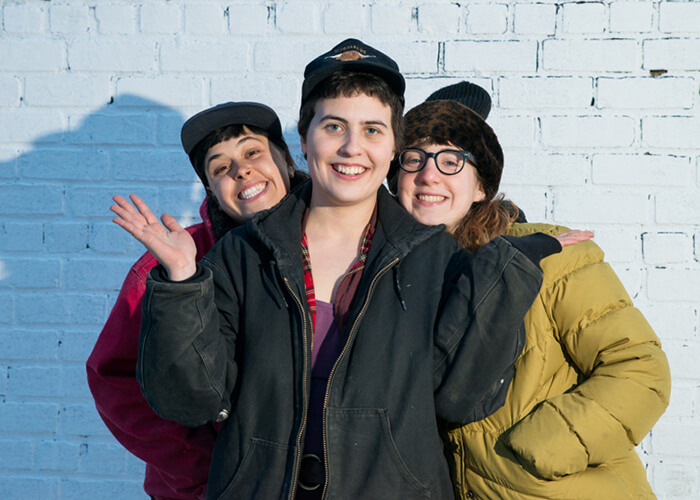
Most of the songs on this album are shorter then two minutes. Did you set out to make a 20-song album?
Ani: We got together to write a bunch of music. We didn’t have that much time.
Lily: We all lived in different places.
Ani: Which I think is why the songs are so rapid. But we were like, we need 15 songs. And then when we started recording, somehow we had even more than that.
Nina: The Bells Part A and B on the album were just in-the-moment improvisation that was turned into songs.
Lily: I remember being really surprised when we did the count at the end. We had been working on some for a year or so—we had five already and then we wrote 10 more in one weekend, and they seemed to fit together pretty well.
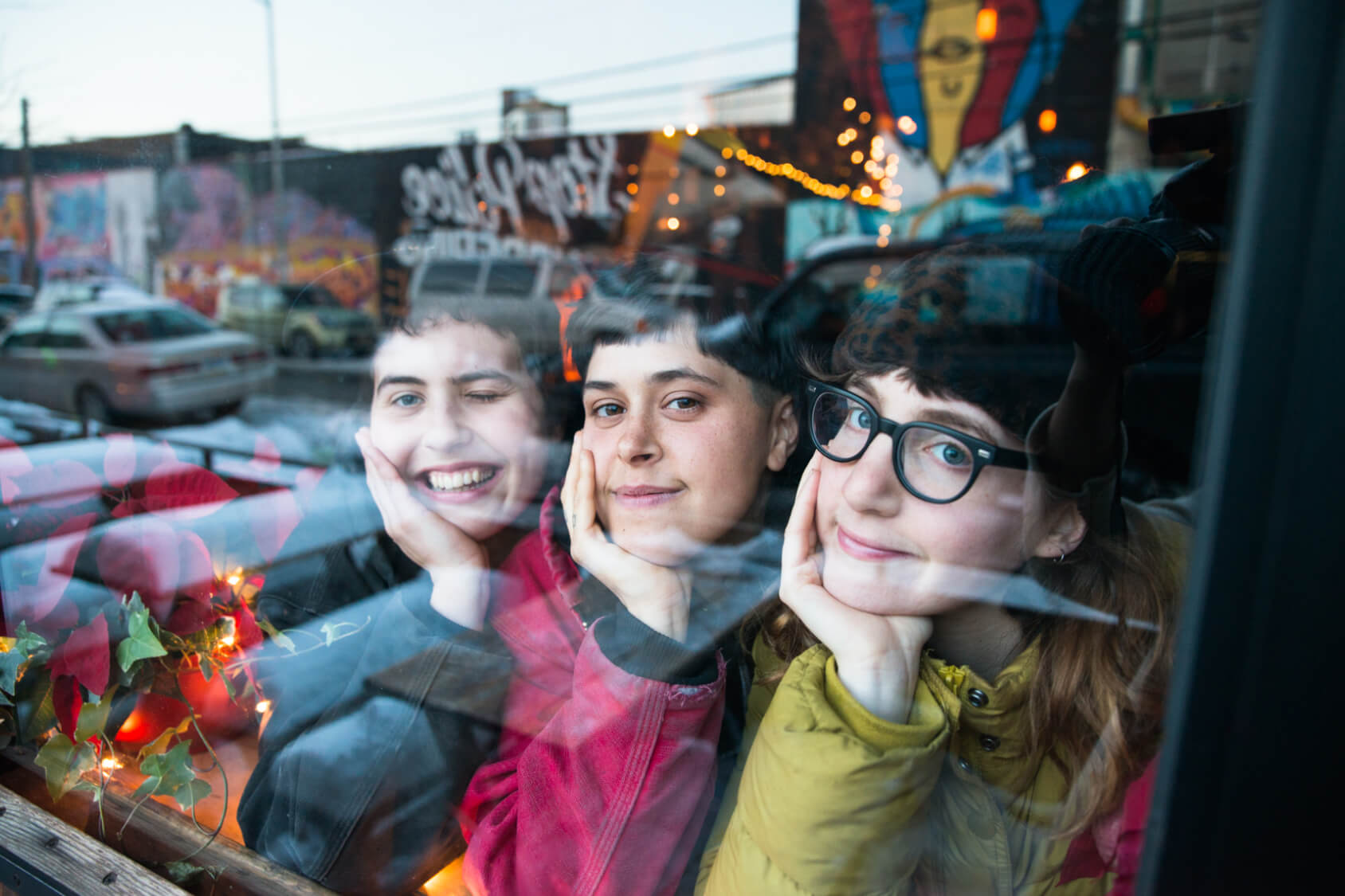

Your previous albums had lyrics that were more narrative. How did you approach the vocals on this?
Nina: I feel like on this album—I don’t know if you guys feel this way—but the lyrics feel the most thought through than they’ve ever been.
Lily: I agree.
Nina: We’re used to making up lyrics and working out how they can fit on top of each other, but for this album it was like OK, we’re gonna sit down and write these lyrics.
Lily: A lot of times, we practice without mics, so we can’t really hear each other. But for this album we didn’t have to change any of the overlapping lyrics, they became a story and fit into place really well. A lot of the messages are more repetitive so it might seem like a texture thing. In the song “She Feels That Way,” we say that to make the point stronger.
I know you have recorded all your albums with the same person (Their friend Paco who plays as The Cradle). Does he have suggestions, or is he more hands off?
Ani: Pretty hands off. We’ll ask him things but he definitely has input, in terms of “Oh i hear something that i have to put on this.” But I think he’s pretty hands off. A lot of the time we are like what do you think? And he’s like great!
Lily: It might be because he likes it or that’s his approach. I don’t know.
Ani: I think it is partially his approach.
Nina: I think where his voice and style really comes in is the post production. Recently, someone told me that this album sounds like a mixture of Paco’s solo albums and Palberta, and I found that really interesting. With the tracks that he had more input on like the bells songs and feeling empty they both do have a vague Paco-ness.
Ani: Yeah it’s because it’s all on tape and that’s his medium. The manipulation of tape is so much a part of his music.
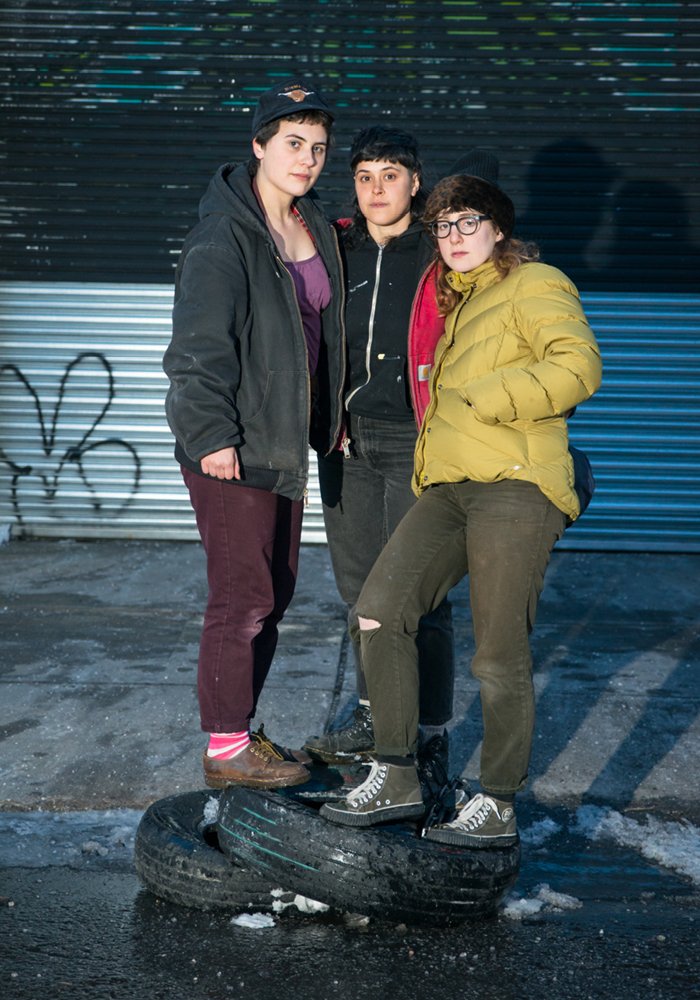

So is the art for this album all stuff you found from your childhood?
Nina: It’s become the theme of this album in a way.
Ani: It really has.
Nina: The album cover—when we were really early in the writing process for this album, the whole time we knew that we wanted Ani’s transcription of “Mary Had a Little Lamb” to be the cover and for it to be called Bye, Bye Berta. It was way before we had the songs for the album ready, and I just happened to have these really weird drawings and letters from when I was a kid that my mom saved. It just worked really well with Ani’s.
Lily: I’m really happy with it. Our last album cover is so weird and aggressive.
Nina: Yeah, this is a little bit more elegant.
Lilly: It’s just funny that we went from that to this.
Ani: Also, it’s the worst Photoshopping job I’ve done.
Nina: You’ve learned a lot since then.
Ani: I really have.
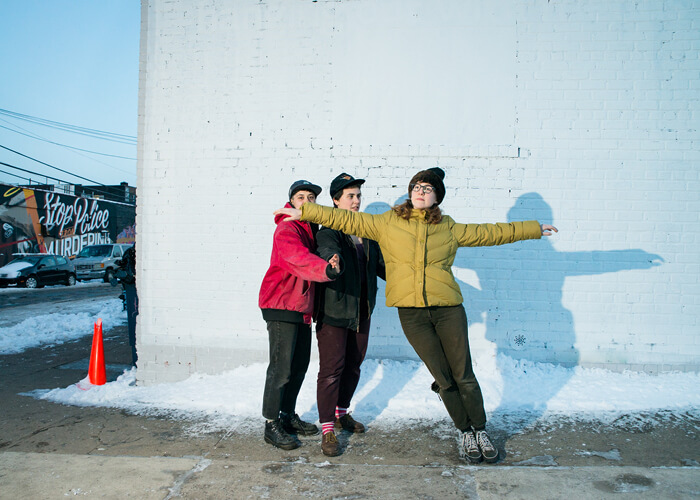

Nina, your brother does really great art for his band Crazy Spirit and his shop Dripper World. Does your brother ever do art for Palberta?
Nina: No. It’s funny, because I’ve asked him in the past, and he taught me a very valuable piece of advice that I take very seriously now, which is that it’s always cooler when people in the band make art for themselves. I think we were already kind of on that tip: he’s encouraging of me to make my own art.
Ani: In the past he would print the shirts. But I learned how to print, so now I print the shirts.
How did you settle on the name Palberta?
Ani: Well, it’s a mystery.
Lily: I think I kind of know where it came from, but it’s blurry. We were thinking about a band name and sitting around a table. My friend came home from work and we were thinking of dad names and she was like, my dad’s name is Albert.
Nina: We like the idea of using a real person’s name in our band name. And for a while we were called ‘Alberta.’ ‘Roberto’ was also in it.
Lily: Not sure how the ‘P’ happened.
Nina: I think, honestly, that Palberta was a separate thing beause for a while we were ‘Alberta’.
Lily: People thought we were from Alberta (Canada).
Nina: We were all like This is a temporary name! But it stuck.
Ani: It’s fitting.
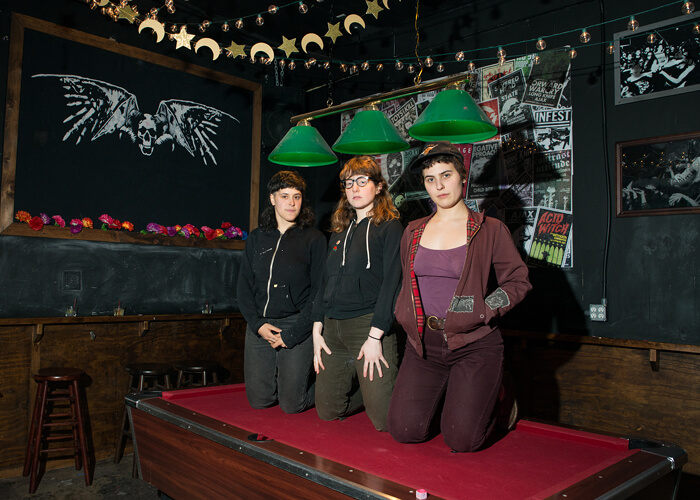

You were recently included in a Rolling Stone article of artists to check out. It started out if you like Mumford and Sons listen to this and by the time you get to the bottom of the list, they are probably pretty confused.
Nina: Yeah I just like the idea of all these rising rappers and pop stars seeing our band. And being like what’s that?
Ani: It’s nice for my dad to be like cool. It’s hard for people, my family to be like you’re in a band, OK. But when they see Rolling Stone they’re like, ooooooh you’re in a band.
Lily: It’s just nice because we are finally recognized by our family.
ALL: [Laughs.]
Nina: Our parents have been extremely supportive from the beginning.
Lily: Yeah, I think we are all really lucky. My parents are sort of in the art world, they do stuff that’s creative so they were like alright you can do this.
It’s just nice [to be mentioned by
Rolling Stone] because we
are finally recognized by our family.
Do the short songs come from the punk tradition?
Lily: I don’t think I was conscious of it.
Ani: No, but we love punk music so it’s subconscious.
Nina: Yeah, I think the punk is always present in our music. I think it’s more coming from our backgrounds and what we listened to growing up. It’s more intuitive.
Was there any music you were listening to or bands you all agree on?
Ani: No. It’s never been our process in terms of writing. We’ve never drawn from other people
Nina: Yeah, I feel like there are bands we listen to together when we are chilling but it never comes into the conversation when we are writing music.
Lily: It’s really just the 3 of us in the room and there is nothing else going on, and we aren’t thinking about anything else. It’s easier that way.
Yeah a lot of times when you have a specific idea it can be disappointing.
Ani: Yeah, it creates a greater challenge to try to be like another band. Or to try to be like something else.
Lily: I think it would be easier for a lot of people if they weren’t trying to replicated music but it’s very ingrained.
Ani: There are some people out there that make amazing music and are trying to sound like something else, but totally failing. Laughs. I think it’s harder to do it that way. It’s already such a fail, because that person’s already made what you wanted to make
Nina: It’s easier to follow your ear, but obviously your ear is gonna be influenced by everything you’ve listened to until that point.
Lily: Yeah, I mean we have tons of influences if you think about it. Like everything we’ve loved and listened to is in there somehow.
Whether we like it or not when the three of us perform, it feels political.
A lot of people are saying the world is a dumpster fire right now. Are any of the songs written with a political message?
Ani: Not really. I think there are definitely politics involved, and inherently so. Not at the forefront. [None of] us are like Let’s write a song about what it feels like to be a female. Being a female is inherently political, and so those things really come through.
Nina: Yeah, especially in the performance. Whether we like it or not when the three of us perform, it feels political. Even if the message we’re delivering isn’t political. It just always feels political in one way or another, whether it’s identity politics, or…
Ani: Because it’s like the crowd is mostly men, or every other band that played before you was all men. So, therefore, you stick out.
Lily: Yeah. I think we’re in it first and foremost to play music together, and see what happens from that, and it’s empowering. I think our lives have changed in a really positive way, because we feel more confident about being in a band and songwriting.
Nina: It’s so true that playing in a band, and feeling good about it, and feeling confident in the instruments you’re playing and the people you’re playing with is just such a life changing and positive thing. I don’t know. It’s not something I’ve had before this band.
Ani: Me either—it’s related to being female for sure, there’s no doubt. We aren’t trying to pitch it like “we’re an all female band,” but there is that connection.
Lily: Even from Day one, I didn’t know Nina very well and
I hadn’t seen Ani in a long time, but I wasn’t nervous. I used to meet up with guys to jam in the past and just be nervous with them, thinking I didn’t know how to play something. Even though I was playing with nice guys, it just made it harder.
Photos by Julie Jamora


You might also like 
















